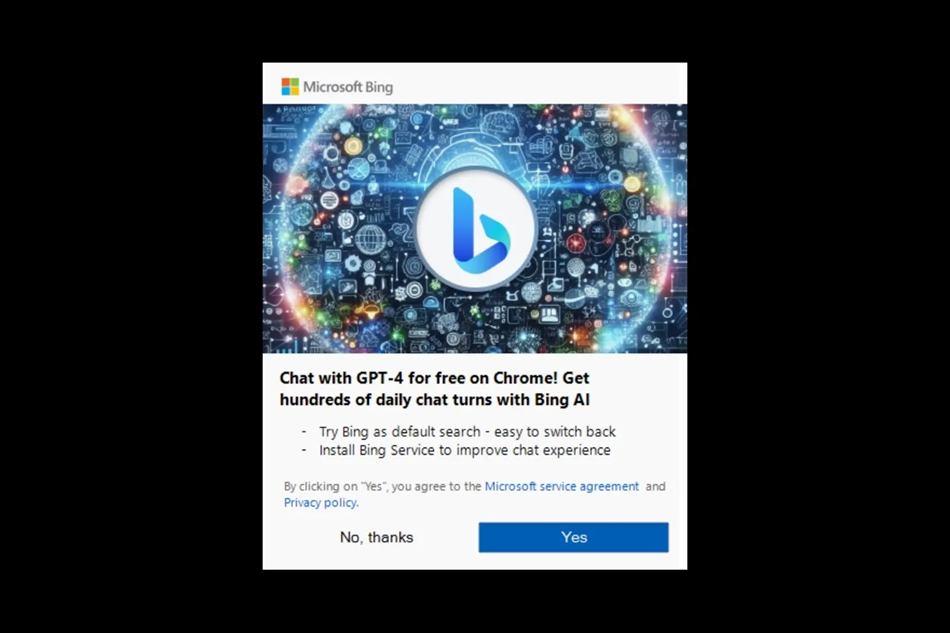Teacher
Professional
- Messages
- 2,669
- Reaction score
- 819
- Points
- 113
How to protect your choice and avoid unwanted changes.
Microsoft has again decided to use pop-up windows in the Google Chrome browser, the purpose of which is to encourage users to switch to the Bing search engine. For the first time, such advertising notifications that resemble the actions of malicious software were introduced last year, when they could appear on top of other applications and windows. After temporarily stopping this practice due to "unintended behavior" of notifications, pop-ups started appearing again on Windows 10 and 11 operating systems.
Windows users have reported seeing new pop-ups in recent days that advertise Bing's artificial intelligence and Microsoft's Bing search engine inside Google Chrome. If you agree to this notification, Microsoft sets Bing as the default search engine for Chrome. Such notifications are perceived by Windows users as potentially malicious and raise concerns about their authenticity.
Microsoft confirmed that the pop-up notifications were scheduled and intended to be displayed only once. "This notification prompts users to select Bing as the default search engine in Chrome once," Caitlin Rawlston, Director of Communications, said in a statement. She also noted that the pop-up window offers additional benefits to Windows users, as when they accept a notification, they get more options to use in Copilot. "We value the ability to give our customers a choice, so there is an opt-out option."

If Microsoft really wanted to give Windows users a choice, it would have developed a convenient way to permanently disable these pop-ups. The company uses a variety of methods to encourage Windows users to switch to Bing and Edge, making it almost impossible to avoid such notifications through system settings.
In recent years, Microsoft has been actively using pop-up ads in Chrome, on the Windows taskbar, and elsewhere to promote its own services. In the past, the company even forced users to switch to Edge after Windows updates, regularly offering full-screen messages calling for switching to Bing and Edge after installing updates.
Microsoft has again decided to use pop-up windows in the Google Chrome browser, the purpose of which is to encourage users to switch to the Bing search engine. For the first time, such advertising notifications that resemble the actions of malicious software were introduced last year, when they could appear on top of other applications and windows. After temporarily stopping this practice due to "unintended behavior" of notifications, pop-ups started appearing again on Windows 10 and 11 operating systems.
Windows users have reported seeing new pop-ups in recent days that advertise Bing's artificial intelligence and Microsoft's Bing search engine inside Google Chrome. If you agree to this notification, Microsoft sets Bing as the default search engine for Chrome. Such notifications are perceived by Windows users as potentially malicious and raise concerns about their authenticity.
Microsoft confirmed that the pop-up notifications were scheduled and intended to be displayed only once. "This notification prompts users to select Bing as the default search engine in Chrome once," Caitlin Rawlston, Director of Communications, said in a statement. She also noted that the pop-up window offers additional benefits to Windows users, as when they accept a notification, they get more options to use in Copilot. "We value the ability to give our customers a choice, so there is an opt-out option."

If Microsoft really wanted to give Windows users a choice, it would have developed a convenient way to permanently disable these pop-ups. The company uses a variety of methods to encourage Windows users to switch to Bing and Edge, making it almost impossible to avoid such notifications through system settings.
In recent years, Microsoft has been actively using pop-up ads in Chrome, on the Windows taskbar, and elsewhere to promote its own services. In the past, the company even forced users to switch to Edge after Windows updates, regularly offering full-screen messages calling for switching to Bing and Edge after installing updates.

